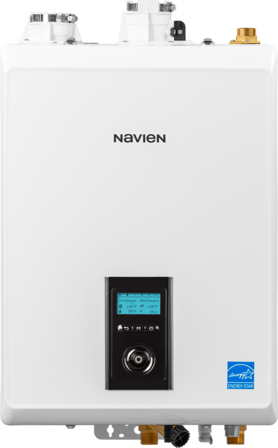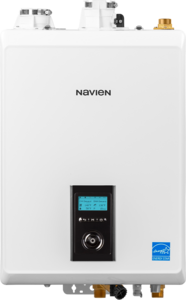NHB-110H premium features and benefits


2" venting up to 65';
3” up to 150’ (including schedule 40 PVC).
Vent Installation Detector (VID) for added safety.

The condensing technology of the dual stainless steel heat exchangers saves energy, reduces greenhouse gasses.

Built-in control for boiler pump 3 zone valves, 3 zone pumps, or 2 zone pumps and an indirect pump.


Advanced user interface with Setup Wizard is made easy with backlit panel, click-wheel control and intuitive text.

Negative pressure regulating gas valve.
Paired with the dual venturi the gas valve provides consistent control of the air/gas ratio. Negative regulation reduces issues on low gas pressure systems.

Field gas convertibility.
Conversion kits for natural gas high altitude (5,400–10,100 ft.) and liquid propane (up to 10,100 ft.) are included.
NHB-110H QuickFacts
17.3" W x 23.8" H x 12.8" D (43.9cm W x 60.5cm H x 32.5cm D)
Product approvals
- CSA
- Yes
- SCAQMD 1146.2(NOx, <20ppm)
- Yes
- ASME Certified
- Yes "H" Stamp
- AHRI number
- 213313056
- Energy star certified
- Yes
Space Heating Ratings
- AFUE, %
- 95.0
- Heating Capacity
- 102,000 BTU/h (29.89 kWh)
| Model | NHB-110H |
|---|---|
| Range | 10,000 - 110,000 BTU/h (2.93 - 32.23 kWh) |
| TDR | 11:1 |
Navien Condensing Boiler Space Heating Ratings | ||
|---|---|---|
| Model1 | NHB-110H | |
| Heating Input | Min | 10,000 BTU/h (2.93 kWh) |
| Max | 110,000 BTU/h (32.23 kWh) | |
| Heating Capacity2 | 102,000 BTU/h (29.89 kWh) | |
| Net AHRI Rating, Water3 | 89,000 BTU/h (26.08 kWh) | |
| AFUE2, % | 95.0 | |
1 Ratings are the same for Natural Gas models converted to Propane use.
2 Based on U.S. Department of Energy (DOE) test procedures.
3 The NET AHRI Water Ratings shown are based on a piping and pickup allowance of 1.15. Consult Navien before selecting a boiler for installations having unusual piping and pickup requirements, such as intermittent system operation, extensive piping systems, etc.
| Item | NHB-110H | |
|---|---|---|
| Dimensions | 17.3" W x 23.8" H x 12.8" D (43.9cm W x 60.5cm H x 32.5cm D) | |
| Boiler weight | 80 lbs (36.3 kg) | |
| Installation location | Indoor wall-hung | |
| Venting type | Forced draft direct vent | |
| Max Vent Length | 2" PVC venting up to 65', 3" up to 150' | |
| Ignition | Electronic ignition | |
| Natural gas supply pressure (from source) | 3.5 " WC to 10.5 " WC (0.87 kPa to 2.61 kPa) | |
| Propane gas supply pressure (from source) | 8 " WC to 13.5 " WC (1.99 kPa to 3.36 kPa) | |
| Natural gas manifold pressure | -0.26 " WC (-0.065 kPa) | |
| Propage gas manifold pressure | -0.25 " WC (-0.062 kPa) | |
| Connection sizes | Gas inlet | 3/4" NPT (male) |
| Power Supply | Main supply | 120V AC, 60Hz |
| Maximum power consumption | Less than 10A | |
| Materials | Casing | Cold rolled carbon steel |
| Heat exchangers | Primary and secondary heat exchangers: stainless steel | |
| Venting | Exhaust | 2" or 3" PVC, CPVC, approved polypropylene (see installation manual for more details) 2" or 3" special gas vent type BH (Class III, A/B/C) |
| Intake | 2" or 3" PVC, CPVC, polypropylene 2" or 3" special gas vent type BH (Class III, A/B/C) | |
| Vent clearances | 0" to combustibles | |
| Safety Devices | Flame rod, APS, gas valve operation detector, ignition operation detector, water temp high limit switch, exhaust temp high limit sensor, Vent Installation Detector (VID) | |
Navien reserves the right to change specifications at any time without prior notice.
Coverage Table for Labor and Parts Only
| Product | Labor | Parts | Heat Exchanger |
|---|---|---|---|
Residential* | 1 Year | 5 Years | See table below |
Commercial | 1 Year | 3 Years | See table below |
Residential*
Residential*
Commercial
Commercial
* Applies only to single family, residential locations.
NHB-110H FAQs
What is a boiler?
A boiler is a heating appliance that is used to heat water, which is then circulated throughout a piping system in a building. The heated water passes through some form of emitter, which will transfer the heat from the water into the building. The cooler water then returns to the boiler to be reheated. A boiler can be designed to heat the water using a variety of different energy sources, including natural gas, liquid propane, fuel oil, or electricity.
How does a boiler work?
A boiler is a relatively simple appliance, but will always include a few key components - a heat exhanger, burner, circulator (aka: pump), and some type of control system. When the building where the boiler is installed cools off, a control will tell the boiler to start. The pump (or pumps) will turn on to begin circulating water through the boiler and the building, and the burner will ignite to heat the water. The boiler control will operate to maintain the outgoing water at the temperature required for the application. As the heated water passes through the building, the rooms will warm up to a point where the control will turn the boiler off.
How long does a boiler last?
There are many factors that can affect the lifespan of a boiler, such as how well the unit is maintained, the water quality passing through the unit, and how well the system is designed to work with the boiler. Most Navien boilers have a 10-15 year residential warranty (depending on the unit). So a well maintained boiler in a properly designed and installed system could be expected to last up to 20 years or longer in some cases.
How do I turn on a boiler?
The operation of the boiler will be controlled by either a thermostat (or mulitple thermostats), or some type of boiler or building control system depending on the design. The Navien boilers have a power button on the front control panel to disable the operation of the boiler if necessary. Installing and service contractors also have access to a service switch inside the cabinet to shut off power to the boiler when needed.
How do I bleed a boiler?
Air in a boiler system can cause issues with overheating or preventing the pumps from being able to circulate water. All Navien boilers ship with an automatic air vent, which is typically mounted at the top of the boiler. The air vent can be used to purge air from the boiler (or bleed air) during the initial fill. Every boiler system requires an air eliminator to be installed in the piping system which will remove any remaining air as the water passes through.
How do I clean a water boiler?
To clean the outside of the boiler cabinet, a soft dry cloth can be used to wipe down the cabinet. Internal components should only be serviced by a qualified contractor.
How do I drain a boiler?
Water should only be drained from a boiler for service, or if the boiler will be turned off for an extended time frame and the system exposed to freezing temperatures. Generally, the boiler will have a drain valve or valves installed in the piping system below the boiler. Prior to draining, power must be turned off to the boiler and the drain valves can be opened. Opening a valve above the boiler may be required to allow the water to drain properly. Consult with a qualified contractor prior to, or if the boiler requires draining.
What is a condensing boiler?
A condensing boiler is designed to operate at a higher efficiency than a non-condensing boiler. This is achieved by using a heat exchanger that will transfer more heat from the exhaust into the water to be used to heat the structure. One of the by-products of a gas burner is water vapor, and when enough heat is removed from the exhaust that water vapor condenses inside the heat exchanger. The benefits of a condensing boiler are higher efficiency (operational cost savings), lower heat loss in the mechanical room, and lower exhaust temperatures.
What size boiler do I need?
Boilers are sized based on the amount of heat they can put out, measured in BTU's (British Thermal Units). The size of the boiler is determined by calculating the heat loss of the building, which is based on the size of the structure, the insulation value of the surfaces, and the door and window sizes. The size of the boiler required must exceed the heat loss to satisfy the system. A qualified contractor can perform a heat loss and help recommend a proper boiler size.
Where do I locate the Serial Number of my unit?
Please see the following attachment on where you can locate your serial number.
I am a homeowner and have a problem with my unit. If I call technical support, can they walk me through troubleshooting my unit?
Because our product involves water, electricity, and gas, there is only a limited amount of troubleshooting that can be done with a homeowner/end-user.
We recommend contacting your original installer or a Navien Service Specialist (NSS) to troubleshoot the unit.
NOTE: Charges will apply for service calls outside of 1 year labor period and/or non-warranty issues. Please see terms of our labor warranty.
Does Navien have Field Technicians available to service my unit?
Because our product involves water, electricity, and gas, there is only a limited amount of troubleshooting that can be done with a homeowner/end-user. We recommend contacting your original installer or a Navien Service Specialist (NSS) to troubleshoot the unit. NOTE: Charges will apply for service calls outside of 1 year labor period and/or non-warranty issues. Please see terms of our labor warranty.
I think there is a part that needs to replaced, how do I get a new part shipped out to me?
If you feel like there is an issue with your unit, please have someone contact Navien Technical Support while in front of the unit with your Serial Number ready. We recommend that a license contractor, original installer, or NSS contact is the person who calls us, so we may do in depth troubleshooting to determine if there is a part failure.
Navien Technical Support will be unable to send out parts without registration of product (Serial Number, Date of Installation, Homeowner Information, and Installer Information).
What is a boiler?
A boiler is a heating appliance that is used to heat water, which is then circulated throughout a piping system in a building. The heated water passes through some form of emitter, which will transfer the heat from the water into the building. The cooler water then returns to the boiler to be reheated. A boiler can be designed to heat the water using a variety of different energy sources, including natural gas, liquid propane, fuel oil, or electricity.



